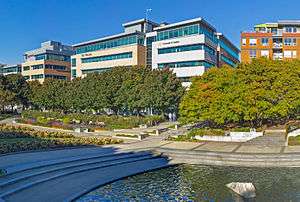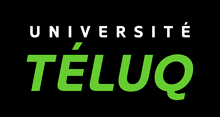TÉLUQ University
Coordinates: 46°48′50.04″N 71°13′22.44″W / 46.8139000°N 71.2229000°W
|
Université TÉLUQ | |
 TÉLUQ headquarters in Quebec City | |
| Type | Public |
|---|---|
| Established | 1972 |
| Rector | Martin Noël |
Academic staff | ~90 professors |
| Undergraduates | c. 20,000 (distance learning) |
| Location |
455, rue du Parvis Quebec City, Quebec, Canada G1K 9H6 |
| Campus | Distance learning |
| Affiliations | Université du Québec, CVU, AUCC, |
| Website | https://www.teluq.ca/ |
 | |
TÉLUQ University (French: Université TÉLUQ) is a public French-language distance learning and undergraduate university, part of the Université du Québec system. Originally founded in 1972 as the Telé-université, Université du Québec commission to develop distance education courses, TÉLUQ University is now a full university which offers programs in undergraduate and graduate studies. Though it is based in Quebec City, about two thirds of its professors work from its Montreal offices.
Students
It has over 20,000 students, more than half of them in the Montreal area.[1] Most students (71%) are females. About a third of all students (35%) taking courses at TÉLUQ are from other universities or in on-campus programs. Most students (64%) are between 20 and 34 years old. About a fifth of the student population (22%) holds a degree. Further information in the French version.
Teaching Methods
TÉLUQ University offers several types of courses. Support format includes paper, DVDs, and Web sites (using content management tools such as SPIP).[2]
Courses are designed by teams led by a professor. Teams include research assistants, associate designers, education science specialists, proof readers and other edition staff.
Under the authority of a professor, tutors help students and mark assignments. Further information in the French version
Research
TÉLUQ University has one research center in informatics: LICEF.
TÉLUQ University has three Canada research chairs:
- Canada research chair in biomedical data-mining;
- Canada Research Chair in Media Education and Human Rights;
- Chaire de recherche du Canada sur le jugement éthique.
TÉLUQ University signed the Berlin Declaration on Open Access to Knowledge in the Sciences and Humanities. Accordingly, it offers an open access repository where the public can access the research works it produces.
Further information in the French version